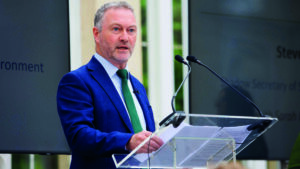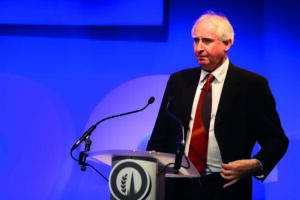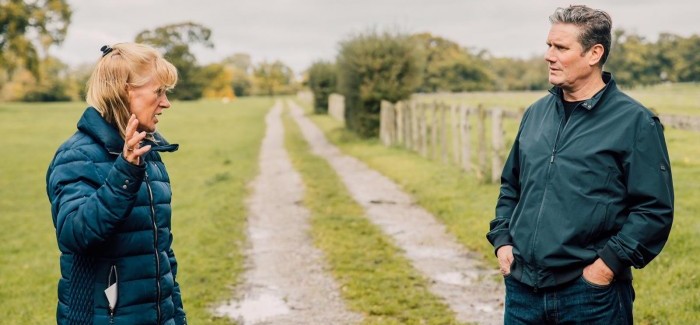Labour’s pre-election plans for farming, while not exactly strong on detail, contained cause for concern and optimism, in almost equal measure. We look at what a Labour government might have in store for the sector.
“The work of change begins immediately,” Sir Keir Starmer said on Friday morning, as his new Labour government took its first steps in power after 14 long years in opposition.
His government begins this work with more than 400 seats and a huge majority after inflicting a crushing defeat on the Conservatives, despite a relatively modest share of the overall vote, at about 34%.
The question for the farming industry now is what will a Labour government have in store for the industry, and the pig sector in particular, after what has not exactly been a smooth ride in recent years under the Conservatives?
Well, there weren’t many clues in Labour’s manifesto. As was the theme throughout the campaign for a party that had it all to lose, detail on farming policy was limited.
Labour did pledge to ‘champion British farming while protecting the environment’ and stressed that it ‘recognises that food security is national security’, a point echoed in all the main party manifestos.
Budget concerns
However, there was one very notable omission from the Labour document. Headline commitments to increase the agricultural budget were made by the Conservatives (£1bn over the course of the parliament) and Liberal Democrats (an extra £1bn/year to accelerate the roll-out of the Environmental Land Management (ELM) scheme.
But while Labour pledged to introduce a land-use framework and ‘make Environmental Land Management schemes work for farmers and nature’, it was silent on the budget.
NFU president Tom Bradshaw welcomed the Liberal Democrat and Conservative commitments, but described the Labour omission as ‘deeply disappointing’.

In a BBC Farming Today interview, Steve Reed, shadow farming secretary, refused to be drawn on Labour’s farm budget or even commit to not cutting the budget, claiming it was difficult to say what it needs to be when it wasn’t clear how the current budget was working.
“I am not going to make un-costed commitments,” he said. “Labour is absolutely committed to ELM. The principles behind it are right, but we don’t think it’s working as well as it could.”
Welcoming the new government, Mr Bradshaw said: “For Britain’s farmers, the number-one priority for the new Labour government must be to set an increased multi-year agriculture budget for the duration of the next parliament. This is about investing in the future of British farming – in home-grown food, in the environment and in renewable energy.”
Welsh lessons
While Mr Reed and other shadow Defra ministers have been at pains to say they value food production and want to be on the side of farmers, the practical experience of Welsh farmers working with a Labour administration hasn’t been good.
Only a huge backlash forced the administration to halt plans for farming and environmental policy reform earlier this year, which farmers feared would have had a devastating effect on the industry.
Amid obvious concerns, Mr Reed insisted Labour had ‘no plans whatsoever’ to introduce a similar scheme in England.
But one farming pledge that did appear in the manifesto – ‘to work with farmers and scientists on measures to eradicate bovine TB, protecting livelihoods, so that we can end the ineffective badger cull’ – has landed badly with many farmers. Mr Bradshaw said the language around bovine TB was ‘incredibly unhelpful’.
“Our members will also want to see the new government’s commitment to food security by being alert to the risk and impact of disease, particularly bovine TB, as we work towards the government’s target to eradicate this terrible disease by 2038,” he said.
Procurement and trade
Even if the detail is short, there are some positive signs, however, including a pledge to set a target for half of all food purchased across the public sector to be locally produced or certified to higher environmental standards, a commitment matched by the Conservatives.
There were welcome noises on trade, too, with a commitment to publish a trade strategy that protects UK farmers from lower-standard imports under future deals.
While Sir Keir has ruled out rejoining the single market or customs union, Labour has made it clear it wants to build bridges with the EU to remove some of the current barriers to trade, including seeking a new veterinary agreement.
Other Labour manifesto commitments potentially of interest to farmers include:
Creating a new publicly owned company, Great British Energy, to deliver clean power by co-investing in leading technologies
- Introducing planning reforms for rural housing
- Improving flood defences
- Speeding up broadband rollout
- Introducing a new rural crime strategy.
“What Labour is offering is a new deal with the farmers,” Mr Reed said. “That includes slashing red tape at the borders, so we can get exports moving again, and no more dodgy trade deals. We all saw what happened with the Australia and New Zealand deals.
“We will use the government’s own purchasing power to back British farmers and, by setting up GB Energy and harnessing the power of wind, waves, solar and nuclear, we can get control of energy in this country and cut farmers’ bills.”
Asked whether Labour would include farmland in inheritance tax, he said the party had given a ‘cast-iron guarantee’ that it would not raise VAT, income tax or national insurance, and insisted there was ‘no need’ in Labour’s plans to raise additional tax. But he did not rule it out.
Pig-specific commitments
The Labour manifesto shed little light on some policy areas of huge interest to pig farmers, including border controls, supply chain regulation and farrowing system reform.
There was a section on ‘stronger animal welfare’ that included a ban on trail hunting, an end to puppy smuggling and farming and the phasing-out of animal testing, but no mention of farrowing systems. Indeed, none of the main parties mentioned it, although the Liberal Democrats did commit to a ban on caged hens.
Labour is expected, however, to at least consider the future of farrowing systems in the UK, particularly with the legislative process already under way in the EU. The process ground to a halt under the Conservatives due to changes in Defra personnel and the pig crisis.

Daniel Zeichner, shadow farming minister in the run-up to the election, who is expected to continue the brief in government, has said in the past that Labour would ‘end the use of farrowing crates’, but has also stressed that he is mindful of the challenges facing pig producers, particularly at the moment’.
“We are signalling our intention to bring in a ban when in government, but I reassure the industry that we will work closely with it to make sure that a ban is introduced in a way that does not damage the industry,” he said back in 2021.
On the introduction of regulation governing pig contracts, on course to happen in the summer but stopped in its tracks when the election was called, he has repeatedly made it clear that Labour also wants to pursue policies that deliver fairness in the supply chain and suggested Labour might even go further.
During a debate on fairness in the food supply chain earlier this year, he accused the government of moving too slowly on its various sector supply chain reviews and farmers have been ‘squeezed by supermarkets and intermediaries driving a hard bargain’.
“Somewhere in the food supply chain, there is clearly an issue of unfairness and imbalance. Put simply, the reward must outweigh the risk if farmers are to continue producing food,” he said.
And in January, Mr Zeichner described government plans to cut funding for illegal import checks at the Port of Dover as ‘both foolish and dangerous’. If Labour wanted to do one simple and not very expensive thing to get an easy win with farmers and show they understood the importance of food security and national biosecurity, they would address this huge oversight from the last government and properly fund these checks at Dover and elsewhere.
Learning lessons
It is, of course, far easier to criticise policy in opposition than it is to implement meaningful and effective policy in government, especially when funding is tight.
We will soon start to learn whether this change at the top is to be cheered or feared for farming. It will probably be a bit of both.
Hopefully, some lessons will already have been learned. When Tony Blair and his new government found themselves in the same position 27 years ago, they made the mistake of underestimating the strength and importance of the countryside, resulting in a bitter clash of values and cultures.
Relations only really cooled towards the end of Labour’s reign as the importance of food and farming became more evident and the personnel in Defra, particularly with Hilary Benn in charge, took the time to engage and, at least in part, work with industry, rather than against it.
If the evidence of the past year or so is anything to go by, Labour has shown a greater understanding of food security and the importance of farming than, perhaps, it in previous years in opposition, alongside a willingness to engage with the farming industry on some key policy areas.
In some ways, Brexit might have helped in this respect. Perversely, some of the issues that came out of it, particularly the dangers inherent in new trade deals and labour shortages, shone a much clearer light on how much the public value UK farming’s standards of production and want to protect them. Labour latched onto this and saw opportunities to campaign arm in with a community it has not always seen eye-to-eye with.
The industry will certainly be hoping lessons from the past have been learned and that this continues in government.
NPA chief executive Lizzie Wilson said: “There remain a number of challenges that we must continue working hard to overcome, not least the threat of African swine fever in Europe and the need to deliver fairness in the supply chain for our farmers.
“We look forward to continuing our close working relationship with Steve Reed and the Labour Defra team to jointly champion the British pig sector.”




